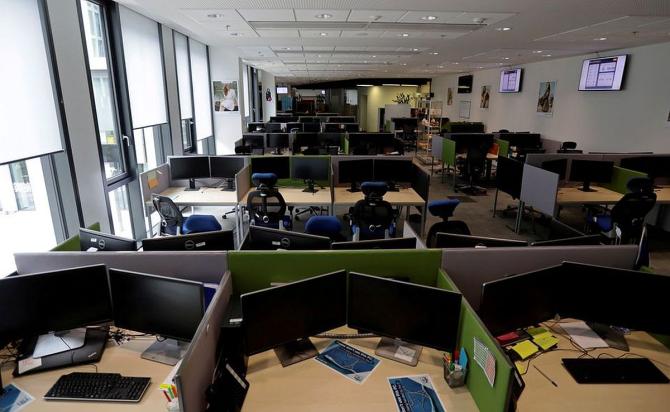Leasing of flexible workspace by corporates rose 73 per cent to 31,538 seats during January-June period on a year-on-year basis, with enterprises looking to save cost besides flexibility that co-working operators offer, according to a report.

In its latest report for the office market, property consultant Cushman and Wakefield said the total seats leased by enterprises could cross 50,000 during the 2021 calendar year.
Enterprises had leased 18,213 seats in the first six months of the 2020 calendar year and 36,255 desks during the entire last year.
"In H1, the number of flex seats leased reached an impressive 31,538, which is nearly 87 per cent of the seats leased during the whole of 2020.
"Based on the result seen, it is likely that the number for the current year could exceed 50,000 seats.
"This sharp jump is observed mostly due to the preference of enterprises to enjoy the benefits of flexibility and cost optimisation that flex spaces offer," the consultant said.
Top officials of coworking and managed office space operators Simpliwork Offices, Smartworks, The Executive Centre and The Office Pass observed that demand for flexible workspace have risen from small, medium and large enterprises.
Gagan Randev, executive director, India Sotheby's International Realty, said, "I am not surprised at these findings. Most companies are still hesitant and uncertain about how COVID will unfold.
"Most large enterprise clients prefer to remain nimble and flexible, rather than being bound with office leases at this time."
Noting that the concept of work from anywhere is far more prevalent and widespread today, he said flexible workspaces offer a great office experience which can boost office productivity and also cut travel time of employees.
Smartworks founder Neetish Sarda said the pandemic has forced newer ways of working and work models, leading companies to rethink their real estate needs.
"As a result, businesses are eyeing managed and flex spaces as their third alternate workspace leading to hub and spokes and distributed offices in the same or different cities to enable maximum flexibility for employees and future scalability options," Sarda noted.
With flexible spaces becoming mainstream, Sarda said there has been a massive spike in the number of inquiries recently and expects managed office spaces to drive the post-pandemic flexible workspace market in the future.
Nidhi Marwah, group managing director, The Executive Centre, said the road to recovery is bringing in a surge in hybrid working for companies and India has seen a surge in demand for the flexible workspace industry.
"Many companies are inclined to reassess their real estate holdings which is subsequently driving demand for the industry."
She said there has been a significant spike in enterprises/MNCs opting for flexible workspaces and including flexibility as a component in their business continuity plans.
"The freedom to scale up and scale down, the cost advantage and the need to diversify risk has made flexible workspace the easy choice for many large scale MNCs. We expect the surge to continue to grow in 2022 as well," Marwah said.
Kunal Walia, CEO & founder, Simpliwork Offices said that discussions with leasing occupiers over the last couple of months have been extremely encouraging for flexible workspace providers.
"Every large organisation looking for additional space today, has a significant bias towards flexible enterprise workplace providers.
"The track record of significant take-up by very large firms over the last 24 months now stands not just as a pilot but also as a huge validation of flex providers being able to cater to the stringent health and safety standards of large global occupiers," Walia said.
Nikhil Madan, co-founder, The Office Pass, said large enterprises and MNCs had mostly preferred to have their own or rented dedicated office space but pandemic has made every business regardless of its shape and size to take a re-look at the hefty outflows, consistent head counts to offices and distributive workforce options.
"This has resulted in even enterprises acknowledging and accepting the flexibility and cost efficiency that flexible workspaces bring in.
"This acceptance would further fuel the demand for flexible spaces manifold in coming months to a foreseeable future," Madan said.
Coworking major WeWork India recently announced that it has given 17,000 sq ft office space in Bengaluru to US-based technology firm 3M's Indian subsidiary. Gurugram-based Skootr also focuses on large corporates as clients.
Photograph: David W Cerny/Reuters









